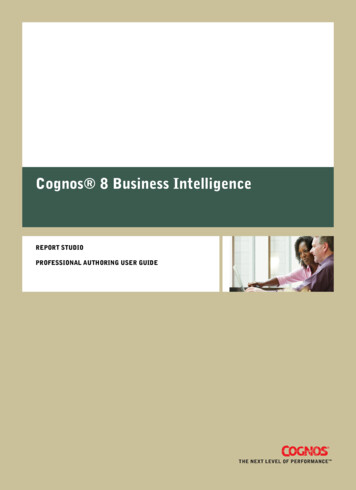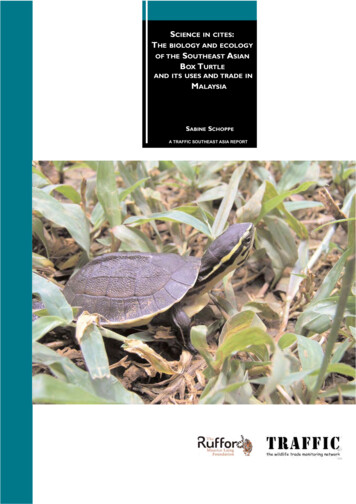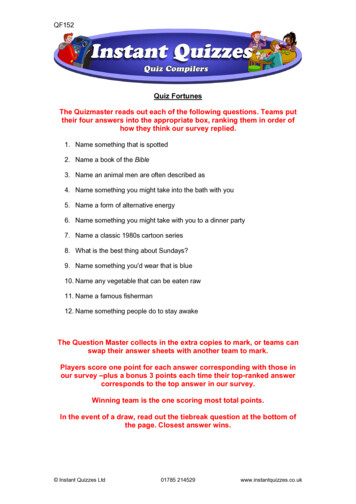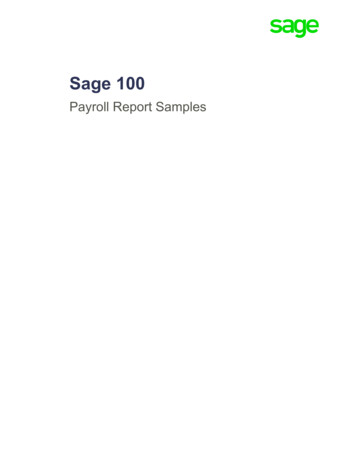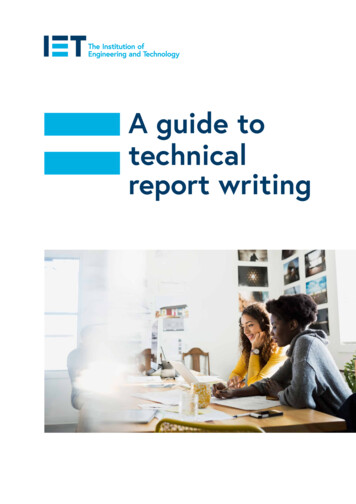
Transcription
Required Report: Required - Public DistributionDate: December 20, 2021Report Number:TU2021-0049Report Name: Exporter GuideCountry: TurkeyPost: AnkaraReport Category: Exporter GuidePrepared By:Caglar Erdogan, Senior SpecialistApproved By: Christine MummaReport Highlights:Turkey has a young population of 84 million people fueling consumption of consumer-orientedagricultural products. The country is in a Customs Union with the EU and is the 20th largest economy inthe world and the 7th largest agricultural producer. Despite the current economic slowdown andgeopolitical difficulties, there is still a gap in the market to fill, and increased demand in the long-termfor many different types of agricultural products is expected to continue. With the effects of COVID19-related restrictions and the stagnation in the economy, food inflation is a major concern but there hasbeen no scarcity of food or beverage availability for those with adequate means.THIS REPORT CONTAINS ASSESSMENTS OF COMMODITY AND TRADE ISSUES MADE BY USDA STAFF AND NOT NECESSARILYSTATEMENTS OF OFFICIAL U.S. GOVERNMENT POLICY
Executive SummaryThe Republic of Turkey is an upper-middle-incomecountry with a young population of 84 million peoplefueling consumption of consumer-oriented agriculturalproducts. The country has a Customs Union with the EUand is the 20th largest economy in the world. Though theTurkish economy stagnated recently, an annual averageGDP growth rate of 3.9 percent is forecasted by the IMFbetween 2021 to 2025. Total imports of consumeroriented agricultural goods have grown 13 percent in thefirst ten months of 2021 compared to the same period in2020. In most cases, U.S. food exporters should utilizeimporters in Turkey to penetrate the market.Imports of Consumer-Oriented Agricultural ProductsEU countries are the major suppliers of consumeroriented agricultural products to Turkey, having theadvantage of proximity and Customs Union duty rates.Turkey imports consumer-oriented products such as rice,dried beans, walnuts, almonds, bananas, coffee, cocoa,composite meat products, fish, lumber, and differentkinds of processed/packaged food items.Quick FactsImports of Consumer-Oriented Ag. Products 2020US 3.5 billionList of Top 10 Growth Products in Turkey (ImportedConsumer-oriented Agricultural Products) 2018-20201. Garlic, fresh or chilled2. Nuts nesoi, fresh or dried3. Whey & modified whey4. Tomatoes in Pcs Prep/Pres5. Guavas, mangoes6. Bulgur wheat, pre-cooked, prep.7. Coriander seeds, not crushed8. Beer without alcohol9. Cumin seeds, not crushed10. Brazil nuts, fresh or driedFood Retailers by Channel (Sales in Mill. USD) 2020Modern Grocery Retailers- Convenience Stores- Discounters- Gas station/ Forecourt retailers- Hypermarkets- SupermarketsTraditional Grocery RetailersGrocery Retailers p 10 Retailers (by Marketshare in 2020)1. Bim2. A 1013. Migros4. Şok5. CarrefourSA6. Ekomini7. Hakmar8. Sec9. Onur10. FileGDP/Population 2020Population: 83.6 million (TurkStat, Year-end 2020)GDP: USD 753 billion (TurkStat, 2019)GDP Per Capita: USD 8,495 (World Bank, 2020)Food Processing IndustryThere are 51,338 food processing and 649 beverageproducing enterprises in Turkey as of 2019, according tothe latest statistics published by The Turkish StatisticalInstitute. Turkey has a modern and developed foodprocessing industry supplying the domestic populationand exporting, especially regionally, accounting for 15percent of total manufacturing in TurkeyFood Retail IndustryGrocery sales totaled 75 billion as of the end of 2020.The inflation/seasonally adjusted Real Retail Sales Indexhas declined slightly in 2019 but started to increase in2020. Despite the recent political and economicchallenges, the food retail industry had been growing,particularly in the hard discount segment.Organized/modern retailers make up the majority of thegrocery market share as traditional retailers slowly exitthe market.EXPORTERS GUIDE, TURKEY - trengthsWeaknessesLong-term GDP andDomestic and internationaldisposable incomepolitical challengesgrowthLarge population base:Current economicyoung and growingdownturn and ed market, open Complex and timefor new itemsconsuming importproceduresGrowing demand for high Strong traditional food andvalue packed food; ready cuisine affect consumptionto-eat/cook meals as thehabits. There is a developedshare of working womendomestic food processingincreasesindustry that also exports.Sources: CIA World Fact Book; EuromonitorInternational; Turkish Statistical Institute, EconomistIntelligence UnitContact: Office of Agricultural Affairs, U.S. Embassy Ankara1
I. MARKET OVERVIEWThe Republic of Turkey, located in the southeast of Europe and the northwest of the Middle East, bordering theBlack Sea in the north and the Mediterranean Sea in the south, has a young population of 84 million people1fueling consumption of consumer-oriented agricultural products. The median age is 32.2 and 59 percent of thepopulation is between the ages 15 to 54. The urbanization rate has reached 76%, with rapid urbanization since2000. Along with the young population, a high urbanization rate, increasing middle-class household income, abroadening base of female participation in the labor force, and a culture of spending drives consumption. Thecountry is an Associate Member of the European Union (EU) and is in a Customs Union with the EU, whichincludes processed, but not primary, agricultural products. In addition, Turkey has Free Trade Agreements withEFTA (European Free Trade Association Countries:Norway, Liechtenstein, Iceland, Switzerland) and 21other countries. Turkey was the 20th largest economyin the world in 2020 according to the World Bank.The average Gross Domestic Product (GDP) growthrate between 2015 and 2019 was 3.2 percent and theannual average GDP growth rate is estimated to bearound five percent between 2021 and 2023 byEconomist Intelligence Unit (EIU). After registeringthe lowest growth rate in 2019 in a decade, at only 0.9percent, Turkey managed to have real growth of 1.7percent in 2020. Turkey became one of only twoG20 countries to register real growth amidst theCOVID-19 pandemic.Source: Turkish Statistical Institute. (E) Estimate by EIU. (F) Forecast by EIU.Despite robust growth expectations in the long term,Turkey’s macroeconomic outlook is facing severechallenges in the short term. Persistent politicalconcerns and geopolitical developments in theregion, the opaqueness of policies and tensions ininternational relations, and investors’ perceptions ofthe lack of rule of law and lack of democraticstandards make the Turkish economy fragile. Thesedevelopments have negatively impacted trade,tourism, investment, and growth.Source: Central Bank of Turkey (CBT). (E) Estimate by EIU.A major concern is inflation in the Turkish economy.The inflation rate by consumer price index (CPI) wasat 14.60 by at the end of the 2020, up from 11.84 percent in 2019. However, the CPI inflation is 21.31 percent(officially, most experts estimate it higher) as of November 2021 indicating a major value loss in the Turkish Lira(TL) causing the purchasing power of the consumers to decline in the country. Inflation by producer price indexis well above the CPI inflation. The value of the lira has depreciated significantly against major currencies likethe U.S. dollar and the Euro in last few years. The latest major devaluation was in Fall 2021 causing about 113percent depreciation2 of TL against USD. The ability of the Central Bank of Turkey to fight inflation andcurrency instability have been undermined by political interventions in the leadership of the Central Bank ofTurkey. Cutting policy interest rates and declarations of a commitment to unorthodox and erratic economicpolicies by the Government of Turkey (GoT) have triggered the latest devaluation. Moreover, since March 2020,Turkey has been struggling, like many other countries, with COVID-19 that adversely affected the economy andfood prices in 2020.12United Nations mid-year estimate for 2020.Exchange rate on September 01, 2021 was 8.30 TL/USD and depreciated further to 17.70 TL/USD on December 20, 2021.EXPORTERS GUIDE, TURKEY - 20212
Incoming foreign direct investments to Turkey per year dropped 53 percent between 2015 and 20203. WesternFDI was replaced by Gulf region investments.COVID-19 has affected Turkey since March 2020. Majorindustries and logistics kept working during the pandemic, as wellas the retail food industry, and there has been no scarcity of fooditems across the country. Nevertheless, major lock downs inTurkey and European countries have affected the Turkisheconomy, as the EU is the largest trading partner. The tourismindustry was also negatively impacted in 2021, like in 2020,because of COVID-19.GDP Composition by Sector Origin, 2020 (%)Agriculture,7.3Services, 30.5Industry, 62.2As of 2020, the agriculture sector represents 7.3 percent, or 52billion, of total GDP. The State Department provides informationabout the investment climate in Turkey which has businessrelated information that can be valuable for traders.Note that some products from the United States currently face additional tariffs, which affects the competitivenessof U.S.-origin agricultural goods in the Turkish market.Table 1: Important socio-economic parameters for TurkeyParameterPopulationMedian AgeLabor Force (ages 15-64)Unemployment Rate (ages 15-64)Unemployment Among Youth* (ages 15-24)GDPGDP per CapitaTrade BalanceTourists (# of foreign citizens entering)Inflation – CPI year-endExchange Rate (end of period)Number of Companies with Foreign CapitalMajor Export Markets (all products)Major Import Sources (all products)Major CitiesValue83.6 million (2020)32.2 (2020)30.9 million (2020)13.1 percent (2020)25.3 percent (2020)USD 716 billion (2020)USD 8,495 (2020)USD -38 billion (2020)22 million (2020)14.60 percent (2020) [21.21%, Nov. 2021]7.35 TRL/USD (2020) [13.70 TRL/USD, Dec. 2021]73,625 (Total as of 2020)Germany (9.5%), UK (6.7%), USA (6.0%), Iraq (5.3%), Italy(4.7%), France (4.2%), Spain (4.0%), Netherlands (3.1%), Israel(2.8%), Russia (2.6%) (2020)China (10.4%), Germany (9.7%), Russia (8.0%), USA (5.6%),Italy (4.1%), Iraq (3.9%), Switzerland (3.1%), France (3.1%),South Korea (3.7%), UAE (2.6%) (2020)Istanbul (15.5 m), Ankara (5.7 m), Izmir (4.4 m), Bursa (3.1 m),Antalya (2.5 m), Adana (2.3 m), Konya (2.3 m), Sanliurfa (2.1 m),Gaziantep (2.1 m), 15 other cities over one million population(2020)Source: TurkStat, CIA World Fact Book, EIU, OECD, Trade Data Monitor (TDM).* According to OECD criteria.3Central Bank of Republic of Turkey.EXPORTERS GUIDE, TURKEY - 20213
Turkey had high expectations for the tourism industry for 2020 after record-high tourist arrivals in 2019.However, the COVID-19 pandemic had major negative effects on the Turkish tourism industry. The number oftourists that traveled to Turkey in 2020 was only about half of the number of tourists in 20194. Travelers areadvised to check the U.S. Department of State travel advisory before planning to travel to Turkey.ADVANTAGESCHALLENGESGDP growth and disposable income growth in thelong-term despite a recent slowdown.Domestic and international political challengesbring instability, which also affects the tourismindustry.Strong and steady retail market, as well as moredual income households, drives new demand forprocessed, frozen, prepared food and ingredients.Artisan domestic products such as baked goods andcheese utilize domestic ingredients and have strongexisting relationships with ingredient suppliers.Large population base: young and growing, middleand upper middle class are growing.Economic instabilities such as exchange ratefluctuations and increasing inflation.High and increasing urbanization rate; increasingrates of female participation in work force.Lack of transparency in rules and regulations.Strong and steady retail market growth.High import duties on processed/packaged foodand agricultural products.A growing market, open for new items forconsumer use. Furthermore, there is a large anddeveloped food processing industry that requires awide range of ingredients inputs. The industry isalso open to new ingredients, like additives andprocessing aids.Importing can be complex: Time-consuming andnon-transparent import procedures.An internationally savvy new generation of Turksare more open to new tastes from abroad.Strong traditional food and cuisine affectingconsumption habits.Growing demand for high value packaged food;ready to-eat/cook meals as the share of workingwomen increases.The Turkish industry has developed many westernorigin products domestically, such as packagedconfectionery products and ready-to-eat meals,rather than import.Fast-growing modern, organized grocery chains.Unregistered economy can create unfaircompetition.Positive perception for products from the UnitedStates.No genetically engineered products or ingredientsare approved for food use in Turkey.Strong food culture and a tradition of gathering formeals in large groups, so new products fitting intothe existing food culture and eating habits areeasily adopted.Marketing for some products can be difficult:Labeling laws limit health-related claims, andregulations limit alcohol advertising.Many regulations are similar to those of the EU, soexpansion to Turkey can be easier for companiesalready exporting to Europe.Competition from many products imported underFTAs or European countries with lower tariffs.Additional taxes were introduced for several U.S.origin goods in 2018, which continues in 2021.4You may check our Food Service: Hotel, Restaurant, Institutional report more information on tourism.EXPORTERS GUIDE, TURKEY - 20214
II. EXPORTERS BUSINESS TIPSa. MARKET RESEARCHIt is important to conduct market research before deciding to launch businesses relations in Turkey; either adetailed analysis or a quick market scan, depending on your product and experience level with Turkey, isnecessary. It is essential to make sure that there is a market for a specific product in Turkey. Even if you areexperienced in diverse regions, the Turkish market might be quite different than expected. It is a mix of MiddleEastern, Western European, and U.S. cultures, traditions, consumers, and business practices. Markets, companies,and consumers in Turkey are less transparent compared to Western Europe and the United States. It is oftenharder and more expensive to access market intelligence; usually there are fewer open sources compared todeveloped economies. Like some other Mediterranean/Levant cultures, most of the market intelligence andbusiness is conducted based on personal relationships. Please visit our country page for other FAS exporterassistance reports. Other reports can be purchased from various sources such as, but not limited to, Euromonitoror Nielsen. Getting a reliable local partner/agent is a good way of starting relationship-based market research.b. LOCAL BUSINESS CUSTOMS & TRENDSAfter conducting market research and determining that there is a potential market in Turkey for thefood/agricultural item that you are exporting, it is important to develop a good strategy for market entryconsidering the local business customs. The Turkish business community is very open to international business.Turkey straddles Southern European and Middle Eastern cultures, and relationships are very important forbusiness. This makes already existing relationships and connections in the country especially important; personalrelationships and connections are essential. Turkish businesspeople attach great importance to courtesy inbusiness-related endeavors. Turkey is a country with a business culture and people that is somewhat likeSouthern/Western European countries/cultures; on the other hand, it has many qualities taken from MiddleEastern/Islamic cultures and Central Asian, Turkic cultures. Business life and habits are all affected from the mixof cultures and traditions, so it is important to understand your counterparts. In most cases, a local businesspartner is very useful to understand the culture context. Some points to consider are as follows: Dress well for business meetings, especially if it is the “getting to know each other” stage. Overdress if notsure what to wear. Dress conservatively if not sure. Shorts, sandals and sportswear are not taken well inbusiness environments, especially for men, even in southern beach cities.Punctuality is taken seriously compared to Mediterranean and Middle Eastern cultures. Standard time is threehours ahead of Greenwich Mean Time (GMT). Turkey has not observed daylight savings time since 2016.Take Turkish and Islamic holidays into consideration. Although business is conducted at all times, it is smartto consider the Islamic holy month of Ramadan and avoid events during the two major Bayram religiousholidays and Turkish Republic Day. It is important to judge how much value your counterpart attaches tothese days. If unknown, err on the side of caution to avoid serious offense.Family is important in Turkey; the superiors in the company are often seen as father/mother figures that needto take care of the employees in many senses.Turkish people take pride in their rich history and cultural heritage. Try to learn something aboutTurkish/Ottoman history.Turkish people are also are proud of their rich and varied cuisine. When you try Turkish food, complimentsare appreciated.Turkish coffee and tea have a special role in Turkish culture and also in business meetings. They will beoffered at the start of a meeting as a courtesy. It is polite to accept one of those beverages when offered orask for a glass of water.Turkish businesspeople prefer to work with people they know and trust on a personal level. In-personmeetings and business lunches and dinners are important to build personal and business relationships; it is agood sign when invited. Try to accept when possible. These relations will affect business opportunities.EXPORTERS GUIDE, TURKEY - 20215
Almost everything is taken personally. There is a very fine line between personal and business matters.In Turkish culture, it is important to take good care of business guests (as they do with personal guests),especially foreign ones. Reciprocity is expected and taken as a positive indicator when done properly.c. GENERAL CONSUMER TASTES & TRENDSAlthough there is a strong Turkish culinary tradition and ample processed food production in the country, uppermiddle and upper income level consumers, especially in large cities like Istanbul, Izmir, Ankara, Antalya, Bursaetc., tend to be open to new, imported tastes. Young and single professionals in the metropolitan areas tend tohave more interest in international travel compared to their parents. Thanks to this younger metropolitanpopulation with increasing disposable income, there is an increased awareness of international tastes and influx ofinternational cuisine in Turkey in the last two decades. This is seen in the rise of Italian restaurants, sushi places,Mexican restaurants, Indian restaurants, East Asian restaurants and takeaways, American-style diners, luxuryburger houses, various fast-food chains dominantly from the United States, and many fusion cuisines. In the lastdecade or so, Turkish supermarkets have been featuring more international ingredients and imported processedfood compared to almost nothing a decade ago.According to Post observations, thanks to the same demographic group, healthy, functional, and organic foodsectors are growing as well. Consumers are becoming increasingly educated about and aware of the quality,nutritional value, and packaging of their food. They tend be more aware of the food safety and expiration date ofthe foods they consume compared to a few decades ago.Except for those at higher income levels, Turkish consumers are price sensitive in general; discount retailers andprivate label brands are on the rise.III. IMPORT FOOD STANDARDS & REGULATIONS and IMPORT PROCEDURESa. CUSTOMS CLEARANCE AND DOCUMENTS GENERALLY REQUIRED BY THE COUNTRYAUTHORITY FOR IMPORTED FOODImport procedures are complicated and burdensome in Turkey. Generally, a local business ally eases the process,as they are familiar with the procedures. For details on the requirements, please refer to FAS Turkey reports onFood and Agricultural Import Regulations and Standards and Required Certificates. The U.S. ForeignCommercial Service also gives some general information on import procedures to Turkey.In most cases, some counseling with a customs broker or consultant in Turkey is useful as thesebrokers/consultants often understand the complex import processes better than a new-to-the-market, lesserexperienced company. You might contact Istanbul, Izmir , Mersin, or Ankara Customs Brokers Association,depending on your needs.b. COUNTRY LANGUAGE LABELING REQUIREMENTSOn January 26, 2017, the Ministry of Food, Agriculture & Livestock (changed to the Ministry of Agricultureand Forestry as of Summer 2018) abolished the previous Turkish Food Codex Regulation on Labeling andpublished two separate regulations to replace it which include: The “Turkish Food Codex Regulation onFood Labeling and Provision of Information to Consumers” (available here in Turkish) and “The TurkishFood Codex Regulation on Nutrition and Health Claims” (available here in Turkish). As with the priorversions of the regulations, these were prepared in parallel to the relevant the EU Directives and Regulationswithin the framework of EU harmonization.Please have a look at the Section II of our Food and Agricultural Import Regulations and Standards Report ifyou need details on labeling requirements. In general, most labeling requirements can be met with a stickerput on the packaging of imported processed food with the appropriate information available in Turkish5.5Nevertheless, each product should be examined, and a decision of packaging and labeling should be made separately.EXPORTERS GUIDE, TURKEY - 20216
c. TARIFFS and FOREIGN TRADE AGREEMENTS (FTAs)There are tariffs for most food and agricultural items imported from the United States to Turkey. The tariff ratesvary for different products. The tariff rates may be checked at the Turkish Ministry of Trade web page by HScode (Tariffs for the U.S. are listed under D.Ü. (Other Countries)). Several agricultural/food items from theUnited States currently face additional tariffs since June 2018. While these tariffs are expected to be temporary,there is currently no timeline for their removal.Turkey is in a Customs Union with the EU. In addition, Turkey has Free Trade Agreements with EFTA(European Free Trade Association Countries: Norway, Liechtenstein, Iceland, Switzerland) and 21 othercountries. Among these 21 countries, the FTA with Syria is on hold for a period of time. Furthermore, FTAswith Lebanon, Sudan and Qatar have been signed but not ratified yet.Due to the FTAs with the EU, UK, and EFTA, European countries are major competitors for U.S. products incategories such as packaged foods and food processing ingredients and additives.d. TRADEMARKS and PATENTSThe Turkish Patent and Trademark Office under the Turkish Ministry of Industry and Technology is responsiblefor Patents and Trade Marks. You can take a look at the Turkish industrial property law which governs the patentsand trademarks and related regulations (link in Turkish) about the applications of the law.IV. MARKET SECTOR STRUCTURE and TRENDSa. SUPPLY CHAIN & PRODUCT FLOWA good way of exporting to Turkey is using a local agent in the country. This agent is sometimes an importer,distributor, wholesaler, a commission-based trader, or some combination thereof. Local representatives will haveexperience in market development and contact information of potential buyers, such as the organized groceryretailers, food processors, and/or food service sector. A good representative can guide you in the market,including on import rules and regulations, which ports to utilize, local business practices, conducting marketintelligence formally or informally, starting sales calls, etc.The chart represents the flow of consumer orientedagricultural goods. In rare cases, retailer/cash & carrymight import items themselves rather than buying from animporter (not shown on the chart).b.RETAIL FOOD SECTORDespite the political and economic challenges that Turkeyis facing in recent years, the food retail industry has beengrowing due to a young, dynamic population with a 75percent urbanization rate and a growing middle class. The grocery retail sector had been growing for the lastdecade up until the recent economic stagnation that began in 2018. Grocery retail sales were 75 billion USD in2020, which constituted 57 percent of all retail sales through approximately 346,000 organized and unorganizedgrocery retailers. Discount and hard-discount chains have been growing for the last five years with their privatelabel products. Several foreign market chains have left the market in the past decade, leaving the stage mostly fordomestic chains. Although still limited in sales, there is an increasing demand for imported processed food.There is also an increasing trend of online shopping for groceries in major cities, especially in Istanbul, Ankara,Izmir, and Bursa as the number of companies that offer online ordering and delivery increase. There was a majorboost to grocery e-commerce in 2020 due to COVID-19 restrictions. Initial reports indicate that supermarketchains saw record sales before the COVID-19 lock-down and throughout the pandemic period so far. There wasno reported scarcity of food or beverages, but significant food inflation was observed. Please read our RetailFoods Report for detailed analysis of the sector.EXPORTERS GUIDE, TURKEY - 20217
c. HOTEL, RESTAURANT, INSTITUTIONAL (HRI) FOOD SERVICE SECTORThe COVID-19 pandemic had a very negative impact on the Turkish consumer food service industry in 2020,with a strong decline in sales and widespread outlet closures seen throughout the industry. Full-service restaurantssaw sales decline by 33 percent by value from 2019 to 2020, as the number of outlets in the category declined by10 percent and transaction volume declined by 43 percent. Both independent and chain restaurants shifted theirfocus towards home delivery. Relatively moderate sales declines were recorded in limited-service restaurantscompared to full-service restaurants during 2020, as such outlets benefitted from strong industry-wide shifttowards less expensive options and home delivery orders. Bars and pubs were required to remain closed for mostof 2020 due to COVID-19 regulations and were the worst-affected of the restaurant sector. Altogether, in 2020,there were about 128,000 commercial food service locations throughout the country, a 12 percent decline from2019. Five thousand institutional food service companies are serving corporations, hospitals, schools,universities, state and municipal offices, nursing homes, and some military bases, either via cooking in their ownfacilities and delivering the food or cooking on customer premises. Please read our Food Service: HRI Report fordetailed analysis of the sector.d. FOOD PROCESSING SECTORDespite the COVID-19 health crises with its political and economic difficulties, the food processing industry isstill one of the largest industries in Turkey. There are 51,338 food processing and 649 beverage productsenterprises in Turkey as of 2019. The food processing industry constitutes approximately 15.3 percent of allproduction industries. During the pandemic, retail sales of packaged foods and organic packaged foods increaseddramatically. Also, sales of products fortified with vitamins and minerals to support the immune system gained inpopularity. Even though U.S. processed foods and food processing ingredients face strong competition from localsuppliers and from European countries, there are still market opportunities for U.S producers. There areopportunities for innovative ingredients and additives, including aromas and flavorings. Please read our FoodProcessing Ingredients Report for more details.V. AGRICULTURAL and FOOD IMPORTSa. AGRICULTURAL & FOOD IMPORT STATISTICSTable 1: Consumer Oriented Agricultural Products Imported from the United States to Turkey (2016 - 2021*)123456789101112131415Thousands of USDTotalAlmonds, Fresh Or Dried, ShelledWalnuts, Fresh Or Dried, In ShellFood Preparations NesoiAlmonds, Fresh Or Dried, In ShellChicken Cuts & Edible Offal, FrozenWhiskiesCigarettes Containing TobaccoPistachios, Shelled, Fresh Or DriedPistachios, In Shell, Fresh Or DriedTomatoes, Other Than Whole or In Pieces, Prep. or Presvd.Tea Or Mate Extracts/Essences/Concentrates & PrepsCheese, Nesoi inc. Cheddar And ColbyCitrus Fruit (Including Mixtures), Prep Etc NesoiOther Non-alch. Beverages (except water & non-alch. beer)Walnuts, Fresh or Dried, ShelledOthers Consumer Oriented Agricultural Products20162017201820192020 2021*365,348 403,783 424,879 391,297 359,873 271,40279,512 67,853 82,596 76,895 95,555 75,23092,780 107,114 109,880 86,718 82,069 62,23247,014 32,744 38,567 24,773 41,856 38,62549,365 66,769 33,515 42,218 38,861 17,16126,193 31,604 26,030 22,261 17,767 8,40716,676 20,660 22,362 14,458 15,096 9,6544287955 13,37811,259 18,357 15,908 15,233 10,230 10,6496,676 11,566 56,081 67,956 9,879 18,2357,8694,0761649,351 4,13801,5153,3463,4341,932 2,899 3,1910001,198 2,372953299491,3382,051 2,050 1,39406891,2411,982 1,926 2,0304,2163,381793550 1,624 2,91431,817 34,596 32,966 23,715 20,175 20,726Source: Trade Data Monitor.* 2021 data is for the first ten months only (Jan. – Oct.)EXPORTERS GUIDE, TURKEY - 20218
Table 2: All Agricultural & Related Products* Imported from the United States to Turkey (2016 - 2021**)123456Thousands of USDTotalCotton, Not Carded or CombedBrewing or D
Dec 31, 2021 · Norway, Liechtenstein, Iceland, Switzerland) and 21 other countries. Turkey was the 20th largest economy in the world in 2020 according to the World Bank. The average Gross Domestic Product (GDP) growth rate between 2015 and 2019 was 3.2 percent and the annual average GDP growth rate is est

